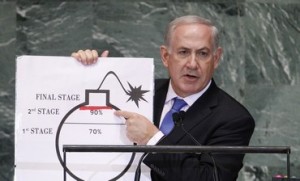 Until a few months ago, it seemed the Iranian nuclear threat would dominate the election campaign. But both the government and the opposition prefer to leave the Iranian Pandora's box unopened.
Until a few months ago, it seemed the Iranian nuclear threat would dominate the election campaign. But both the government and the opposition prefer to leave the Iranian Pandora's box unopened.With less than two weeks to E-day, the campaign entered the homestretch Tuesday night with the official party propaganda broadcasts on television. One life-and-death issue is still strangely absent, though many believed it would animate a heated debate: what to do with Iran?
The nuclear threat lurking in Qom and Fordow is the issue that dominated the news agenda in Israel for most of the past year, and earlier, it was serious enough, even "existential," to the extent that it provoked a major diplomatic row between Benjamin Netanyahu's government and the Obama administration and, at least from Netanyahu's perspective, the sanctions that Western powers imposed on Iran, at Israel's behest, are the foremost achievement of his premiership. So why has it barely taken up any of our time over the last three months?
On Tuesday night, Netanyahu gave an hour-long interview to Channel Two's Ya'akov Eilon. The interview had obviously been produced over several weeks and was filmed in multiple locations - his parents' home, the prime minister's residence, David's Citadel and East Jerusalem archaeological digs. But Iran came up only once, when Eilon questioned Netanyahu about the much-touted interview ex-Shin Bet chief Yuval Diskin gave Yedioth Ahronoth last Friday, in which he described a "decadent" atmosphere at top-level meetings on Iran. "I held the most serious meetings ever on Iran," Netanyahu assured him. And that was that.
Also on Tuesday, on his party's television campaign ad, Iran barely got a nod. In the long list of the Likud government's achievements the international sanctions on Iran were mentioned and Netanyahu, gesturing to a map of the Middle East said that his greatest challenge was preventing Iran from building nuclear weapons. But it was lost in the rhetorical cacophony. None of the other parties mentioned Iran (except Kadima, who reminded us that their leader, Shaul Mofaz, was born there, but nothing else) and unless someone is planning to pull the Iranian rabbit out of their hat, this will probably remain the state of affairs until January 22. The Israeli voters will not get a chance to hear their leaders explain how they plan to confront this strategic threat.
Here are five reasons why Iran has fallen off the Israeli public's radar:
1. Obama's reelection:�There has been no shortage of clashes between Jerusalem and Washington over the last four years and the last thing Netanyahu needs in an election period is a reminder of the acrimonious toing and froing with a re-elected Barack Obama that await him. A potential Israeli strike on Iran is perhaps the greatest source of tension with the American administration, so why bring it up?
2. Netanyahu is vulnerable on Iran: The prime minister may have made Iran his cause celebre but he has nevertheless witnessed all the former heads of Israel's security establishment ganging up against him on this issue. Most recently came Diskin's scathing allegations in Yedioth that Netanyahu and his closest allies mixed personal and political motives in the decision-making process on Iran. Putting Iran back on the agenda will just provide the defense chiefs with a convenient target.
3. The attack is off, for now: After months of posturing, Netanyahu admitted, for all practical purposes, that Israel will not carry out an attack on Iran until mid-2013. The postponement, announced in his speech at the United Nations General Assembly last September, created the impression that Israel had been bluffing all along and was never serious about attacking in the first place. Bluffs don't make good election propaganda.
4. Gaza is closer: Operation Pillar of Defense erupted in November just as the election campaign was getting underway and reminded Israelis that Gaza is a much closer launching pad for missiles than Tehran.
5. The parties have other interests:�Not only Likud-Beiteinu has little interest in making these elections about Iran; few of its rivals are eager to talk about the issue. Habayit Hayehudi is every bit as hawkish as Likud, if not more. Labor wants to focus on economics and social welfare, Hatnuah is trying to make shift the focus to the peace process and Yesh Atid is trying to portray itself as the champion of the middle class, while Shas is doing the same with the working class. Iran has become irrelevant to just about every party, with the exception of Kadima, who tried to make it an issue in their early posters which featured an ominous atomic mushroom cloud. But Kadima has become virtually irrelevant. Ehud Barak initially tried to position himself as the only defense minister Israelis can trust to make the right decision on Iran, but he is now out of the game.
By Haaretz
The Iran Project is not responsible for the content of quoted articles.










